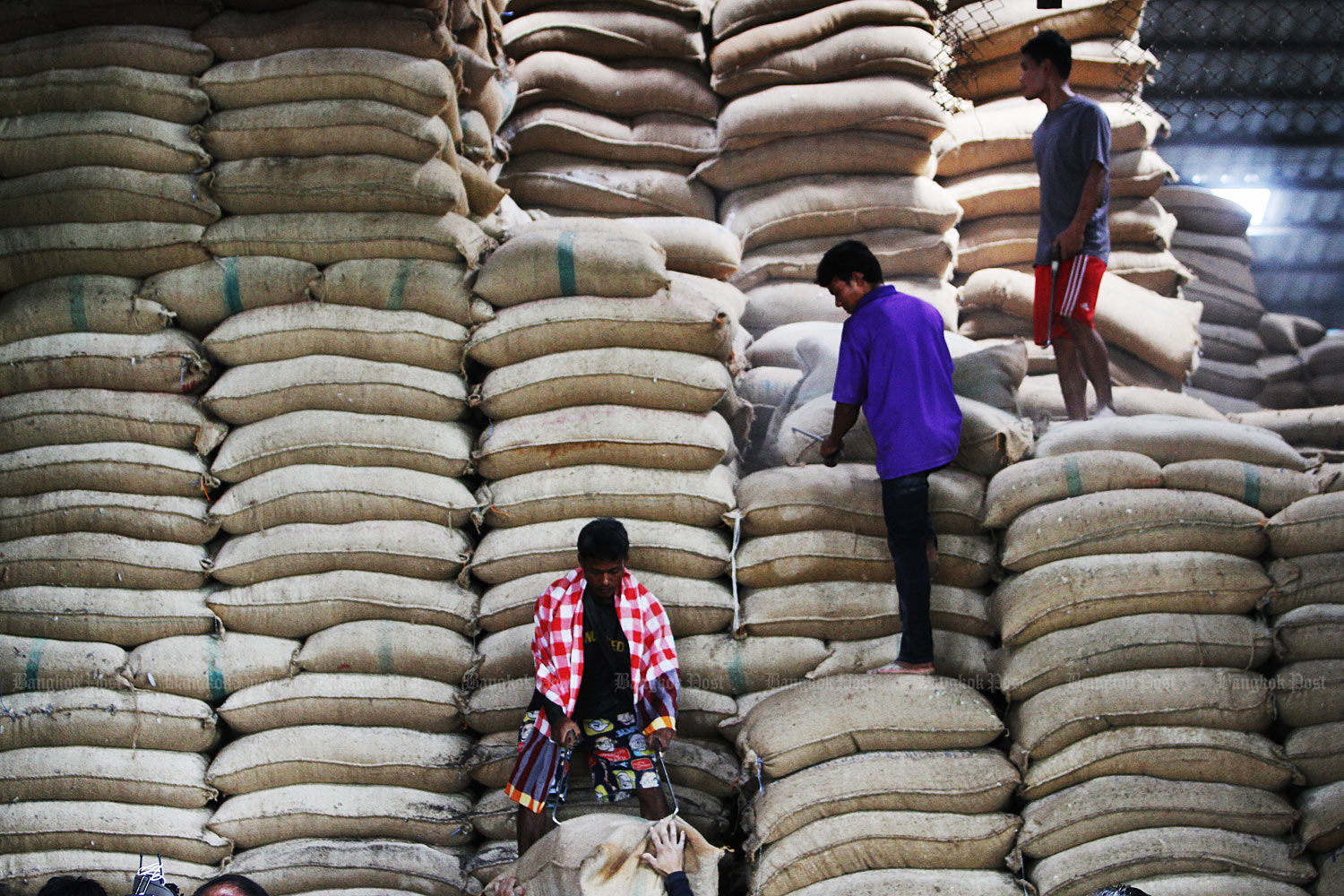Yingluck Seeks Retrial in Rice-Pledging Case, Petitions to Delay 10-Billion Baht Compensation on New Evidence
The legal team for former prime minister Yingluck Shinawatra is preparing to petition the Administrative Court to seek a delay in the Finance Ministry’s 10-billion-baht compensation order. The aim is to secure a retrial by presenting what they describe as a new set of evidence. The team, led by lawyer Norawit Lalaeng, is currently compiling documents related to the sale of more than 18.5 million tonnes of rice that remained in warehouses following Thailand’s military coup on May 22, 2014, a pivotal event that toppled Yingluck’s government during the height of the rice-pledging programme.
The government’s actions and the lawsuit’s trajectory come at a crucial juncture as the rice-pledging scheme remains a central and controversial chapter in Yingluck Shinawatra’s political and legal saga. While the precise income generated by the rice sales is still being verified, Norawit indicated that the total will exceed the 10-billion-baht amount Yingluck has been ordered to pay. He noted that the final figure will be disclosed to the press only after verification, underscoring the ongoing nature of the evidence review and the potential implications for the compensation order.
The Finance Ministry initially demanded 35.7 billion baht in compensation for damages attributed to the rice-pledging scheme implemented during Yingluck’s tenure. In a landmark ruling, the Supreme Administrative Court, on May 22, determined that Yingluck should pay only a partial amount of 10 billion baht. Norawit said that the retrial petition, grounded in “a new set of evidence,” will be filed with the Administrative Court within the legally mandated 90-day window. The new evidence is widely believed to center on revenue records from the sale of rice stocks, potentially reframing the financial aspects of the case as the court considers a retrial.
The case has drawn attention to the 18.9 million tonnes figure that has been cited in discussions about the stockpile and its disposition. Previously, Norawit stated that 18.9 million tonnes of leftover stocks were sold during the current administration and could have generated about 250 billion baht if sold at 25 baht per kilogram. The lawyer stressed that if the Administrative Court accepts the retrial petition, the Finance Ministry would likely seek to delay enforcing the 10-billion-baht compensation order in light of the new evidence and the possibility of a retrial outcome. This strategic approach aligns with the broader legal philosophy that retrials, while not guaranteed, can pause execution of adverse rulings pending further review.
Finance Minister Pichai Chunhavajira, speaking publicly yesterday, indicated that he would await updates from the permanent secretary of the finance ministry before taking a stance on the compensation order or the formation of a committee to examine the court ruling. He also said he was not aware of Yingluck’s intention to petition the Administrative Court for a delay in enforcing the compensation order, signaling a potential shift in how the government might respond to the retrial request depending on the new evidence surrounding the rice sales.
Section 1: Background and Context of the Rice-Pledging Controversy
The current petition to delay enforcement sits within the larger and highly contested history of the rice-pledging programme initiated during Yingluck Shinawatra’s tenure as prime minister. The policy aimed to bolster farmers’ incomes by guaranteeing them a minimum price for their rice, with the government purchasing vast quantities of grain to secure support in the agricultural sector. However, the programme also led to significant financial strain on state coffers, allegations of mismanagement, and questions about transparency in procurement and accounting.
The military coup on May 22, 2014, disrupted Yingluck’s administration as it was actively pursuing the rice-pledging scheme. In the aftermath, the government’s measures and the handling of the stockpile became a focal point of political and legal debate. The warehouses filled with rice stockpiles, and authorities faced scrutiny over how the assets would be disposed of and how the program’s costs would be recouped if required in court.
In this context, the 18.5 million tonnes of rice that remained unsold and stored in warehouses are central to the ongoing legal discussions. The scale of the stockpile underscores the potential financial implications for the state, as well as the complexity of attributing financial responsibility for the programme’s outcomes. Over time, estimates about the sales of these stocks and their revenue have varied, contributing to a dynamic evidentiary landscape that legal teams now say warrants a retrial.
The Supreme Administrative Court’s May ruling, which ordered Yingluck to pay 10 billion baht rather than the full amount initially sought, marked a significant milestone in the case. The court’s decision reflected judicial consideration of the damages incurred from the rice-pledging programme and its financial ramifications for the government. Yet, the legal process did not end there. The defence team has argued that additional revenue records from rice sales constitute a new evidentiary set that could alter the financial calculus if a retrial were granted.
This backdrop helps explain why the legal team views the new documentation as potentially decisive. If the Administrative Court accepts the retrial petition, the court could revisit the assessment of damages and the appropriate amount Yingluck should be required to pay. This possibility also raises questions about how the state might respond through enforcement actions, court procedures, and potential continuations or delays in the 10-billion-baht order while the retrial proceeds.
Section 2: The Retrial Petition – Process, Timing, and Strategy
Norawit Lalaeng and the Yingluck team have framed the retrial petition as a procedural step grounded in the discovery of new evidence that could impact the court’s understanding of the case. The 90-day window to file the retrial petition is a critical procedural element, and the legal team is intent on submitting the petition within this timeframe to preserve the opportunity for the Administrative Court to consider a retrial with the new facts in view.
The proposed retrial hinges on the assertion that the new evidence—identified as revenue records from the sale of rice stocks—presents a substantially different evidentiary landscape than what was previously examined in court. The team’s strategy appears to be twofold: first, to obtain a reconsideration of the damages awarded (or the partial award) in light of the revenue data, and second, to potentially adjust the legal calculus governing the compensation amount through a retrial that re-examines the core facts of the case.
Key procedural considerations in this phase include the court’s evaluation of the relevance and materiality of the new evidence. The Administrative Court would assess whether the evidence constitutes a “new set” that could reasonably influence the outcome of the case. The timing of the filing is also pivotal because it must occur within the legal window and prior to compulsory enforcement steps that might otherwise commence or proceed based on the existing ruling.
If the court accepts the retrial petition, there is potential for a deferral of enforcement actions pertaining to the 10-billion-baht compensation order. The logic behind a delay would be to ensure that the retrial process runs its course without the pressure of immediate enforcement, thereby maintaining due process and allowing a complete reexamination of the facts in light of the new records. This approach mirrors general legal practice in administrative and civil proceedings where new evidence can lead to a retrial and a revisited damages assessment.
The broader strategic aim behind the retrial petition is to achieve a more accurate and comprehensive accounting of the rice-pledging programme’s financial impact. The defence contends that the revenue potential of the rice sales, as captured by the new records, could drastically reshape the liability landscape and, by extension, the amount of compensation payable by Yingluck. The petition’s success would depend on the Administrative Court’s willingness to grant a retrial and to consider the new evidence in a manner consistent with legal standards for new discoveries or substantial evidentiary advancements.
Section 3: Revenue Records and Their Potential Impact
The heart of the new evidence revolves around revenue records from the sale of substantial rice stockpiles, with estimates circulating that the 18.9 million tonnes of rice stock could have yielded a substantial return for the state. The figures discussed in public statements suggest that if the sales had occurred under the then-current administration at an assumed price, revenue could reach the hundreds of billions of baht, dramatically surpassing the 10-billion-baht compensation order. Specifically, discussions have pointed to a hypothetical revenue figure around 250 billion baht if the stock were sold at 25 baht per kilogram, although the precise revenue remains contingent on verification and the sale terms.
This potential revenue picture is central to the retrial petition because it would refranchise the monetary dynamics of the case. If the new revenue records are verified and deemed credible by the Administrative Court, they could argue that the damages or liabilities associated with the rice-pledging programme were miscalculated or misrepresented in the original proceedings. In a retrial, the court would re-examine the relationship between government expenditures, the policy’s objectives, and the actual financial returns or losses realized from the sale of the rice stockpile. The new documentation might reveal more about how much revenue was earned, the timing of sales, and any associated costs that would affect the net result.
The potential implications extend beyond mere numbers. A dramatic revision of the revenue picture could reshape the judicial assessment of accountability for damages under the rice-pledging scheme. It would also raise questions about the way revenue figures are accounted for in compensation calculations and whether the state’s financial position from the programme should be treated differently when evaluating liability. The defence argues that these records provide a more complete and transparent view of the rice sales and their outcomes than the information presented in prior proceedings.
In evaluating the new evidence, the Administrative Court would consider multiple factors: the credibility of the revenue records, the methodology behind the revenue calculations, and how these records align with the overall context of the rice-pledging programme. The court might also weigh whether the new evidence affects the proportionality and reasonableness of the compensation order, potentially leading to a revised amount or a different approach to damages.
Section 4: Government Response, Statements, and Administrative Considerations
Finance Minister Pichai Chunhavajira’s recent statements reflect a cautious approach to the evolving legal process. He indicated that he would await information from the Finance Permanent Secretary before forming a view on the compensation order or on whether to establish a committee to review the court ruling. The minister also stated that he was unaware of Yingluck’s plan to petition the Administrative Court to seek a delay in enforcement, highlighting a potential disconnect or lack of communication regarding the formal legal strategy from the government’s side.
This stance underscores the sensitivity and complexity of coordinating a government response to a high-profile legal matter that intersects political, financial, and administrative dimensions. The Finance Ministry’s role is central in managing the fiscal implications of the compensation, and any delay or alteration in enforcement would carry significant budgetary and policy implications for state finances. The possibility of an enforcement delay depends not only on the court’s decision on the retrial petition but also on how the government chooses to respond to the court’s procedural developments and the new evidentiary materials.
The formation of a committee to examine the court ruling would imply a structured, internal process aimed at reviewing the legal and fiscal ramifications of the decision. The government’s posture on such a committee would be informed by broader political considerations, budgetary constraints, and the potential for legal precedent in similar cases. While Minister Pichai’s remarks did not confirm or deny plans for a committee, they signal a readiness to engage with the matter in a measured and information-driven manner, awaiting further guidance from senior civil service officials.
The Administrative Court’s reception of the retrial petition and the credibility of the new revenue records will significantly shape the government’s response going forward. If the court accepts the retrial and evaluates the new evidence favorably for Yingluck’s side, the government may face a longer process of adjudication, possible reassessment of damages, and potential adjustments to enforcement timelines. Conversely, if the retrial petition is dismissed or deemed unsatisfactory, the original 10-billion-baht order could remain in effect, prompting continued or immediate enforcement depending on the court’s ruling and related administrative decisions.
Section 5: Legal Implications, Potential Outcomes, and Future Outlook
Looking ahead, several legal pathways exist depending on how the Administrative Court handles the retrial petition and the new evidence. If the court grants retrial, the proceedings would require re-evaluation of the core facts, including the rice purchases, the policy’s goals, and the resulting damages or liabilities. The retrial could result in an adjustment to the compensation amount, a remand for further fact-finding, or even a possibility that the case is resolved in Yingluck’s favor if the new evidence proves decisive.
If the retrial petition is accepted, one immediate practical consequence could be a delay in enforcing the 10-billion-baht payment. This would align with standard legal practice in which enforcement is suspended while a retrial is underway or pending a final decision on the retrial outcome. However, the specific relationship between retrial outcomes and enforcement delays would be governed by the court’s orders and the applicable legal framework.
If, on the other hand, the court denies the retrial petition, the 10-billion-baht order would likely stand, and enforcement could proceed according to the court’s original directive and any subsequent rulings. In such a scenario, the government’s budgetary planning and fiscal management would need to accommodate the payment while considering any related administrative remedies or statutory avenues for appeal that might still be available.
The broader political and economic implications of the case are significant as well. The rice-pledging program has long been a focal point of debate over state intervention in agriculture, accountability for public policy, and the management of national finances. Any changes in the legal status of the compensation order or shifts in the revenue picture from rice sales could echo through public policy discussions, influencing how similar programmes are designed, implemented, and reviewed in the future.
Conclusion
The ongoing legal maneuvering surrounding Yingluck Shinawatra’s 10-billion-baht compensation order represents a complex intersection of policy, finance, and judicial process. The pending retrial petition, anchored in what the defense describes as new revenue records from the sale of large rice stockpiles, could reshape the evidentiary landscape and potentially alter the case’s outcome. The Administrative Court now faces the task of evaluating whether the new evidence constitutes a legitimate basis for a retrial and whether it merits delaying enforcement of the existing ruling.
As the Finance Ministry awaits further information and the government contemplates its strategic response, the case continues to unfold within a framework shaped by the 2014 coup, the rice-pledging programme, and the broader political environment. The next steps depend on the Administrative Court’s assessment of the retrial petition, the credibility and relevance of the new revenue records, and the government’s readiness to adapt to a possible new phase in the case. The outcome could have lasting implications for Yingluck’s legal standing, the state’s fiscal calculations, and the handling of future large-scale agricultural subsidy schemes in Thailand.



